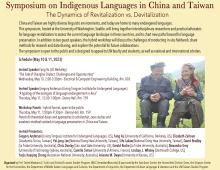Wednesday, May 10, 2 p.m. – Thursday, May 11, 2023, 9:30 p.m.
The Turkic and Central Eurasian Studies Program in MELC is pleased to host a two-day hybrid Symposium on “Indigenous Languages in China and Taiwan: The Dynamics of Revitalization vs. Devitalization.” The symposium is intended to raise awareness of linguistic diversity and the challenges of language revitalization in China and Taiwan; and to examine various policies, theories, methodologies, and applications associated with language revitalization there. By bringing interdisciplinary researchers and practitioners together to share their scholarship in progress, and their practical language revitalization efforts, the event aspires to encourage meaningful advances in the study of language diversity and endangerment in the region. Particular topics covered will include: the methods for doing research on indigenous languages (particularly in the context of restricted access to specific regions in the PRC), and the need to create repositories for storing and sharing existing language data for various purposes, including documentation, research, and revitalization, and the challenges of conducting in-situ fieldwork and sharing data, the potential for future collaborations.
The symposium is open to the public.
MEETING LINK (THURSDAY EVENTS ONLY)
https://tinyurl.com/mrn2w4tv [MS Teams meeting - no app needed]
SCHEDULE
Wednesday, May 10, 2:00-3:30 pm PDT - Electrical & Computer Engineering Building, Rm. 003
Invited Speaker
Fang Xu (University of California, Berkeley)
“The Fate of Shanghai Dialect: Challenges and Opportunities”
Thursday, May 11, 12:00-1:00 pm PDT - Denny Hall, Rm. 159
Opening Remarks
Talant Mawkanuli (University of Washington)
Invited Speaker
Gregory Anderson (Living Tongues Institute for Endangered Languages)
“A Typology of the Ecologies of Language Endangerment in Asia”
Workshop Panels – hybrid format, open to the public
Thursday, May 11, 1:00 pm-10:00 pm - Denny Hall, Rm. 159
Session I. 1:00 pm - 2:45 pm PDT
Theoretical bases and approaches to scholarship on indigenous languages
Speakers:
Fang Xu, (University of California, Berkeley)
Camille Simon, (University of Amiens)
Gerald Roche, (La Trobe University)
Trent Ukasick, (University of Washington)
Chair: Gregory Anderson (Living Tongues Institute for Endangered Languages)
Session II: 3:00 pm – 4:45 pm PDT
Highlights of current research on indigenous languages and cultures in China and Taiwan
Speakers:
Alexandra Grey, (University of Technology, Sydney)
Siyu Liang (University of Washington)
Jiun-Yu Liu, (University of Washington)
Margaret Yun-Pu Tu, Huiyu Lin & Susan (Yang-Hsun) Hou (University of Washington)
Chair: Talant Mawkanuli (University of Washington)
Coffee Break: 4:45 – 5:00 pm PDT
Session III: 5:00 pm – 6:45 pm PDT
Methods for doing indigenous language research on contemporary China and Taiwan
Speakers:
David Bradley (La Trobe University)
Elizabeth Zeitoun (Institute of Linguistics, Academia Sinica)
Amy Pei-jung Lee (National Dong Hwa University)
Talant Mawkanuli (University of Washington)
Chair: Myriam Lapierre (University of Washington)
Dinner Break: 6: 45 – 7:55 pm PDT
Dinner for Conference participants and invited guests
Session IV: 8:00 pm – 9:30 pm PDT
Case studies in progress on indigenous languages in China and Taiwan
Speakers:
Sifo Lakaw, (National Dong Hwa University)
Chris Donlay (San José State University, US)
Yarjis Xueqing Zhong (Australian National University)
Chair: Fang Xu, (University of California, Berkeley)
Closing Discussion: 9:00 pm – 9:30 pm PDT
Organizer: Prof. Talant Mawkanuli, Turkic and Central Eurasian Studies Program (University of Washington)
Sponsors:
The East Asian Center
The Humanities Division Dean
The Simpson Center for the Humanities
The Department of Middle Eastern Languages and Cultures
The Department of Linguistics
The Department of Asian Languages & Literature
The Taiwan Studies Program
As we begin today’s program, we acknowledge that we live and work on the unceded ancestral lands of the Coast Salish people, the land which touches the shared waters of all tribes and bands within the Duwamish, Puyallup, Suquamish, Tulalip and Muckleshoot nations, and pay our respects to elders past and present. We make this acknowledgment as one part of our commitment to working to create inclusive and respectful partnerships that honor Indigenous cultures, histories, identities, and sociopolitical realities.
